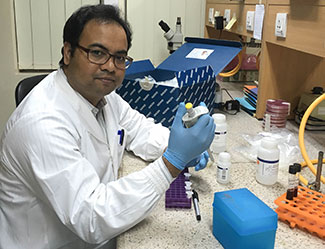Profile: Fogarty Fellow Dr Mohammad Aminul Islam battles antimicrobial resistance in Bangladesh
November / December 2017 | Volume 16, Issue 6

Image courtesy of Dr. Mohammad Aminul Islam
By Karin Zeitvogel
When Dr. Mohammad Aminul Islam applied to be a Fogarty Fellow in 2012, the New Delhi metallo-beta-lactamase-1 (NDM-1) gene was causing a stir in the medical world. NDM-1 makes the bacteria that cause everything from diarrhea to blood infections, meningitis, and infected surgical wounds resistant to antibiotics, including carbapenems, seen as a last-resort treatment for E. coli infections. The NDM-1 gene was widespread on the Indian subcontinent, and was moving rapidly to other countries.
Islam was awarded the fellowship and spent a year looking into how NDM-1 established a presence in the Bangladeshi capital, Dhaka. "If we can identify the source of antimicrobial resistance and control it locally, I think it can be controlled in other parts of the world and there will be less frequent dissemination of so-called superbugs," he said. The CDC has called antibiotic-resistant superbugs "a major global threat," and former U.N. Secretary General Ban Ki-moon told the U.N. General Assembly that antimicrobial resistance poses a "fundamental threat to human and animal health and sustainable development, to sound economies and social cohesion."
Islam hypothesized that there would be a high frequency of NDM-1-producing bacteria in the environment in Dhaka, particularly near hospitals, which discharge liquid waste directly into the sewage system. After analyzing waste water and tap water samples that he collected around Dhaka, Islam found that NDM-1 or the bacteria that produce it, were present in half the effluent samples. That finding, he said, is alarming in a city like Dhaka, where up to 100,000 people are packed into a square mile in the city's slums, clean drinking water is scarce, sanitary infrastructure is lacking, and antibiotics, which can be obtained without a prescription, are often misused.
His fellowship has not only produced actionable results but also given Islam the opportunity to spend time at Stanford University and the University of California, Berkeley, working with experts in antimicrobial resistance research. There, Islam says he was able to benchmark his research activities against findings of renowned international scientists, and set goals for his future and that of research in Bangladesh. He also mastered a modeling technique that he subsequently applied in his lab at the International Centre for Diarrhoeal Disease Research, Bangladesh (ICDDR,B).
A key benefit of his Fogarty fellowship is that it has led to several other grants. For instance, Islam was named principal investigator on an NIH grant that is studying multidrug-resistant urinary tract infections (UTI) caused by E. coli in Bangladesh, and whether E. coli is transmitted from poultry to humans. "Because we use antibiotics massively in Bangladesh to treat infection and as a growth promoter in poultry, we have a high burden of antimicrobial-resistant E. coli in poultry," Islam explained. "We also have a high burden of UTI caused by multidrug-resistant E. coli in humans."
In addition to his NIH grant, Islam has received funding from two British government agencies and Oxford University, which he says will allow him to continue his research for at least five years. He's also been named to the WHO advisory group on antimicrobial resistance, which seeks to reduce the health impacts of the use of antibiotics in food animals.
Islam ascribes his many successes to the Fogarty fellowship, which he says was the impetus behind the other awards. "As a fellow, I received a lot of exposure - I contributed to a paper as second author with work that I conducted during my three-week stay at Stanford - and, at the same time, was exposed to U.S. institutions and researchers," he said "The Fogarty fellowship has also helped raise the international profile of the ICDDR,B, which has given research in Bangladesh a boost."
Fogarty's Global Health Program for Fellows and Scholars provides a yearlong mentored clinical research experience abroad for postdoctoral fellows and pre-doctoral scholars.
More Information
To view Adobe PDF files,
download current, free accessible plug-ins from Adobe's website.